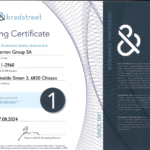HIGH SCHOOL OR APPRENTICESHIP?
An in-depth study on the “integrated maturity” in order to direct young people towards the right choice after compulsory schooling.
www.franzosini.ch | Phone +41 (0)91 695.50.10
Recent statistics on the choices made by young people at the end of compulsory education say that the number of young people going on to school is increasing, but half of them will never finish university. The figure is sobering especially since some students say that their choice is dictated by the fact that at 14 or 15 years old they do not yet know which direction to take and that they imagine that high school offers more long-term options; Others say they were pushed by their parents…
The reality is that at the end of compulsory schooling, young people do not have the right maturity to be able to make informed choices about their future and adults often fail to guide them adequately in their decisions: then what ultimately decides the future of each one is neither the qualifications, nor the practice already acquired … Only skills and intelligence count.
These are qualities that are stimulated both at school and in the workplace, but then something intervenes that makes an ordinary person, even without specific qualifications, a “living encyclopedia” like Piero Angela; sharp and thin pens of journalism such as Enrico Mentana, Enzo Biagi or Giuliano Ferrara; a man of letters like Eugenio Montale; geniuses of modern computing such as Steve Jobs, Bill Gates or Mark Zuckerberg; world-successful entrepreneurs such as Henry Ford or the more current Ralph Lauren; or a revolutionary, brilliant and innovative designer like Walt Disney. Then it is true, there would also be an endless list of people with educational qualifications who have been successful … So what to choose? What advice should you give to young people to be adequately trained in the choice of their future, school or work?
Probably, here the phrase of the Latin masters who said “in medio stat virtus” – virtue is in the middle – thus wanting to indicate the invitation to seek balance, the “middle way” between extremes. In fact, the ideal would be to opt for a solution that allows to deepen at the right point the theoretical and practical aspects of the professional future of a young person, to be able to follow him in his evolution until he becomes autonomous for the moment of choice to be made at a more mature age, 18 years, without losing the opportunities that the two opposite paths can offer.
School education solutions exist, but you need to know them in order to guide young people towards the most appropriate choice. Current figures show that at the end of compulsory schooling, around two-thirds of young Swiss people choose to undertake a vocational traineeship. This type of training allows to combine school theory with the practice carried out directly in the company and above all allows young people to quickly get in touch with the complex world of work, but to continue their studies would take another supplementary year.
Few people know, however, that there is the possibility of following the 3-year school internship integrating it with the professional maturity: this path, called “integrated maturity”, allows you to obtain in just 3 years of study what is normally achieved in 4 years (3 + 1) in addition to the diploma, which can allow access to the University of Applied Sciences and Arts of Southern Switzerland (SUPSI). 21
With this in mind, Franzosini offers young Swiss students who have obtained a Swiss secondary school diploma numerous high-quality training opportunities in a pleasant, dynamic and youthful environment.
The selections generally take place during the month of March each year with a pre-selection based on the documentation sent by e-mail (Curriculum Vitae, photograph, school booklet, Swiss secondary school diploma and notes for the integrated maturity). Candidates with an average of the notes in the compulsory subjects (Italian, English, German, mathematics, science, geography, history, physical education, expressive and technical skills option) of at least:
– 4.30 (4.28) with 2 aptitude courses;
– 4.40 (4.39) with 1 aptitude course;
– 4.50 without aptitude courses.
Subsequently, the candidates selected for a fact-finding meeting are convened at the Chiasso headquarters; at the end of these interviews, Franzosini selects the selected trainees, asking them to prepare themselves for teamwork and reminding them to participate in this important training course with seriousness, resourcefulness and passion.
For “practical” vocational training, apprentices work three days a week in the company in the first year, 2.5 days a week in the second year and three days a week in the third year. This phase is aimed at materially learning the activities and acquiring the specific knowledge of the task. The practice is carried out in rotation at the various offices learning diversified and stimulating tasks and weighing the practice on the interests and attitudes of each one, in compliance with the school training plan.
During the three years, Franzosini’s internal trainers dedicated themselves with passion and professionalism to supporting young trainees on the various job tasks, stimulating them to continuous improvement and self-criticism: it is the “trainer” of apprentices who supervises their training, assigns increasingly complex tasks, follows their academic performance and establishes the rules of work.
As far as “theoretical” training is concerned, young people attend the vocational school (CPC, Centro Professionale Commerciale) for two days a week in the first year, 2.5 days a week in the second year and two days a week, plus one a month, in the third year. Professional teaching includes the subjects of the school program (Italian, history, German and/or English, mathematics, computer science, business administration and politics, business accounting and word processing). Sometimes the theoretical courses are accompanied by practical exercises.
Introductory courses (CI, inter-company courses) are also set up, which take place in the training centres of professional associations (SCI-Ticino). During these courses, apprentices have the opportunity to perfect the basic techniques of their profession.
During the internship the young people learn to interact with the entire working environment (Management, colleagues, customers and suppliers, partners, officials of the Customs Administration etc.), carry out customs clearance of goods, manage customs warehouses, deal with the various problems of modern logistics, arrange shipments of goods, perform various administrative tasks (accounting, invoicing, banks, insurance, payroll, etc.), manage purchases (from the selection of business partners to the material purchases of goods) and perform commercial functions (welcoming customers, actively proposing our services, managing offers and providing advice).
The salary level of the apprentice commercial employee in logistics and forwarding companies is defined by the Collective Agreement: CHF 830 for the first year, CHF 1,020 for the second year and CHF 1,200 for the third year, again for 13 months (data extracted from the OCST website). In addition, apprentices are entitled to at least 5 weeks of holiday per year until the age of twenty.
At the end of the training, the Federal Certificate of Competence with Integrated Baccalaureate – AFC – is obtained, which certifies that the profession covered by the internship has been learned according to the pre-established program.
The young people who obtain maturity with the integrated path in Franzosini become very coveted by companies that are looking for young staff and already trained for work: this experience guarantees the acquisition of in-depth skills in different professional fields (transport, logistics, commerce, customs, banks and insurance) and allows young people to enrich their curriculum vitae with a considerable level of experience, albeit at a young age.
Moreover, this type of training involves a considerable expenditure of resources for companies, given the innumerable commitments to which trainers are subject and the new rules to which apprentices are subjected during the course of the internship. For this reason, the commitment of companies in this area has been considerably reduced over the years, so much so that to date Franzosini has remained the only shipping company in Chiasso that hires apprentices.
Franzosini strongly believes in the value of “integrated maturity”, so much so that it has committed itself directly and involving the Chamber of Commerce of the Canton Ticino in supporting and disseminating this training course, to the point of proposing the establishment of additional tutors for the management of some particular tasks common to the companies that employ trainees.
In the hope that finally young people can find the right opportunities for training and professional growth on the labor market, we indicate, for completeness of information, the e-mail box to which to apply indicating in the subject “APPLICATION APPRENTICESHIP”: formazione@franzosini.ch.
See also Franzosini-Solutions
https://franzosini-solutions.ch/i-giovani-ed-il-futuro-liceo-o-apprendistato/






